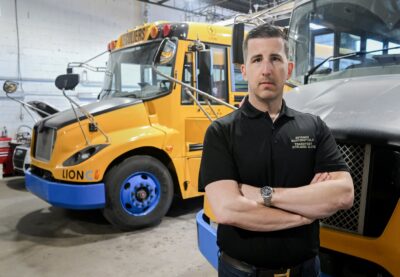Quebec bet big on Lion electric school buses. Now critics say the plan has backfired
By Canadian Press on September 16, 2025.

MONTREAL — The Quebec government’s aggressive push to electrify its school bus fleet — while giving one local manufacturer a virtual monopoly — could now be turning school bus operators off electric vehicles and delaying the transition, critics say.
The abrupt withdrawal of 1,200 Lion electric school buses from Quebec roads after a bus in Montreal caught fire last week is prompting renewed criticism of the provincial government’s approach to electrification.
Many school bus routes in Quebec remained cancelled Tuesday as bus operators completed inspections and made repairs to the vehicles’ wiring, following guidance from Lion. Three Lion buses have caught fire in the last year, though nobody has been injured and the buses’ batteries were not involved.
Chantale Dugas, president of the Quebec federation of bus operators, said Tuesday that about 50 per cent of Lion buses are back in service in Quebec. The operation should be mostly complete by Wednesday evening, she added.
But Dugas said the episode, which began Thursday night when the province ordered Lion buses off the road, is the latest in a “chaotic” series of events since the Quebec government embarked four years ago on a mission to electrify the school bus fleet, which she said has left bus operators feeling “abandoned.”
It’s not just carriers who are raising concerns. Valérie Tremblay with the Canadian Electric School Bus Alliance said provincial policies have already hindered the uptake of electric buses, and the fires will only aggravate the problem. “Right now, if I were a school bus operator, I could see very few good reasons to make the transition,” she said.
In 2021, Quebec mandated that all new school buses purchased in the province be zero-emission as part of a goal to electrify 65 per cent of its bus fleet by 2030. But the subsidies it offers to bus operators to buy electric vehicles require that they be assembled in Canada, meaning that Lion is the main beneficiary of the program.
The province was trying to support a local company, Tremblay said, since Lion is headquartered in St.-Jérôme, Que. “I think it was really a matter of political will.”
But the quasi-monopoly that Quebec gave to Lion has had consequences for private carriers like Andrew Jones, a Montreal-area bus operator. He said the eight Lion buses he owns are unreliable, in part because when they break down, it can take weeks to get them back on the road.
“In the case of Lion buses, we’re obligated to only deal with their certified techs. So we’re waiting on them to have availability. We’re waiting on them for parts,” he said. “We’re subject to waiting on them 100 per cent of the time.”
Dugas and Tremblay both said Quebec should make it easier for operators to purchase buses from elsewhere, especially in light of the string of negative headlines about Lion in recent months. After seeking protection from its creditors in December, the struggling manufacturer was acquired by a group of Quebec investors in May.
The Quebec government has invested heavily in Lion, and Premier François Legault said in May that the province stood to lose about $140 million.
“Perhaps broadening the administrative criteria and allowing other manufacturers to sell their vehicles in Quebec will give the transition a second wind,” Tremblay said. “It could definitely help to ensure that electric school buses are not exclusively associated with Lion in the public’s mind.”
Lion’s financial woes left operators in a bind earlier this year, unable to buy more electric buses while the company was in bankruptcy protection and forbidden from buying diesel replacements. In the spring, the Quebec government finally scrapped its requirement that all new purchases be electric.
Jones said he has since cancelled orders for 20 new Lion buses, and has ordered diesel buses instead. He said a deciding factor for him was the province’s decision last year to reduce annual financial support for operating the electric buses from $12,900 to $5,000 per vehicle. “It’s a huge shortfall for us to cover,” he said.
According to Jones, the insurance cost for an electric bus is triple what it would be for a diesel equivalent. Electric buses also go through more tires because the vehicles are heavier, he said, and operators have to pay to maintain electric charging stations. The operators’ federation estimates that each electric bus costs $14,000 more per year to operate than its diesel counterpart.
“When you start adding it all up and then knowing that (Lion) went through financial difficulties, you start wondering, will they still be here in two or three years?” Jones said. “So if that means I have to put off electrification for two or three years again … I’ll roll that dice.”
In the spring, the government increased its subsidy for the purchase of electric buses to $240,000 per vehicle, up from a maximum of $175,000. But Jones said the sticker price of Lion buses has also increased, so operators are still paying the same amount.
Dugas said the federation hopes to meet with the Quebec education and transport ministers to chart a path forward. “The government’s mistake wasn’t in wanting electrification, it was in the business model that was imposed on our carriers,” she said.
“It was in saying that you would receive financial assistance on the condition that you use the services of a single manufacturer.”
This report by The Canadian Press was first published Sept. 16, 2025.
Maura Forrest, The Canadian Press
25-24




